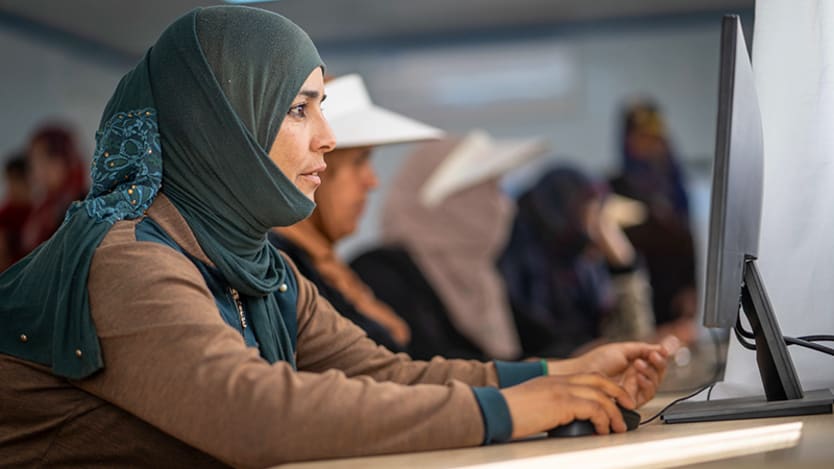
BARCELONA — Arriving in the United States in 2015, Mustafa Ali, a refugee from Iraq, was optimistic about his career prospects. He believed his experience working with U.S. donors and implementing organizations in Iraq would help him continue his development career. Over the next few years, however, he would face “rejection after rejection.”
“A lot of barriers prevented me [from getting] a position or opportunity that related to my work experience working with USAID and a lot of international organizations in Iraq,” said Ali, who now works in recruitment and staffing at Tetra Tech.
“There’s a bit of ignorance as to what a refugee can bring to [an] organization.”
— Naser Haghamed, CEO, Islamic Relief WorldwideOccasional feedback from recruiters indicated that, while Ali had the necessary skillset and overseas experience, his lack of domestic experience or qualifications from a U.S. institution were holding him back. He finally went back to school to complete a master’s degree, and he believes this helped him land his current role.
Cultural differences and misunderstandings are another challenge for refugees and other newcomers, Ali said. Interview policies and approaches can vary between countries, and refugees could benefit from employer-led workshops on preparing for interviews in the U.S. job market.
But despite all the conversations around diversity and inclusion in the aid sector, Ali believes there are still “hidden attitudes” and employers tend to hire candidates “just like them.”
Refugees can add real value to development organizations, Ali said. They bring international skills and experience to the workforce, as well as different languages, diverse backgrounds, and new perspectives that can benefit employers. Having often survived great adversity and lost almost everything, refugees also have a personal desire to regain self-sufficiency. They demonstrate flexibility and a strong work ethic and are often eager to give something back to the society that has welcomed them.
Naser Haghamed, chief executive officer at Islamic Relief Worldwide, agrees that there is still a stigma around refugees and a perception that they are not educated or capable of complex work.
“There’s a bit of ignorance as to what a refugee can bring to [an] organization,” he said, adding that many people are surprised to learn he arrived in the United Kingdom as a refugee in 1984 and now heads up a global organization.
Employers are missing out on a huge talent pool by overlooking this group. Refugees can “genuinely reinforce development agencies’ values for equality, equity, and diversity,” and be ambassadors of their work, Haghamed added.
But many refugees lack confidence, and even those who already had well-established careers can struggle to make professional progress in a new country. Preoccupied with adapting to their new surroundings, it can take a long time for them to have the headspace to focus on their own skill and career development.
Haghamed said there is a lot more that development organizations could be doing, adding that while Islamic Relief Worldwide supports organizations working with refugees, it doesn’t have an in-house initiative to integrate refugees directly into its workforce. Employers need to help refugees develop their skills and build confidence, whether it’s through traineeships or with external support from organizations specializing in this type of work, he suggested, in order to create a pipeline of candidates.
That must then be followed up with building a work environment in which they can thrive — perhaps by coordinating with organizations focused on training and integrating refugees — and working with them on cultural assimilation.
What you don’t want, cautioned Haghamed, is to bring refugees into an organization that doesn’t have the resources to support them and therefore sets them up for failure. Equally so, they don’t want to feel that they are given special treatment simply because they are refugees.
Jamie Munn, director of humanitarian policy at the Norwegian Refugee Council, admits that creating the right environment can be tricky, and many agencies don’t succeed in making it work. It can depend on styles of leadership and how this opens up opportunities, he explained, and about looking at people’s skills, instead of where they come from. Almost half of NRC’s 14,000 staff are people from the communities they work in, and this includes staff in their offices in the global north.
How development organizations can help cities welcome refugees
Ensuring cities can adequately cater to refugees requires a shift from humanitarian aid alone — which helps to meet refugees’ immediate needs — to development aid that can help support them in the longer-term.
Ali would like to see organizations setting up committees focused on community engagement and creating specific talent pools to attract and source qualified refugees. He is currently working with his team on ways the organization can better engage non-U.S. candidates and utilize their expertise in proposals and projects. Organizations can really learn from the exchange of ideas and perspectives that comes from having diverse teams, he said.
Haghamed and Ali agreed that networking, a critical component of any job search, is another real challenge for refugees who often have to start building local contacts from scratch. Ali spent a lot of time attending networking events, presentations, and job fairs — and it was through a development sector job fair that he found out about and applied for his current role. But, for individuals lacking confidence and still getting to grips with the culture, networking can be very daunting.
According to Haghamed, the best way for employers to engage refugees is to tap into local community organizations run by different diaspora groups. In London, for example, there are significant Somali, Eritrean, Kurdish, and Syrian diasporas, and you can start to create a network by linking with their grassroots organizations. This can be difficult and it takes time to build those relationships, he admitted.
“[But] we still need to support those communities that are run and organized by refugees … and help them network,” said Haghamed. “That way we can actually amplify the support we give.”








